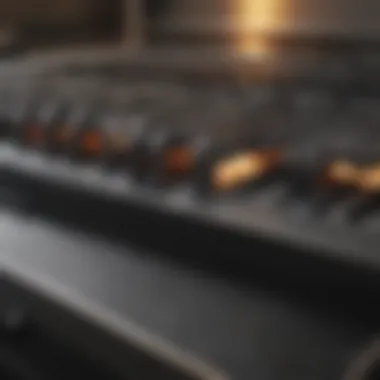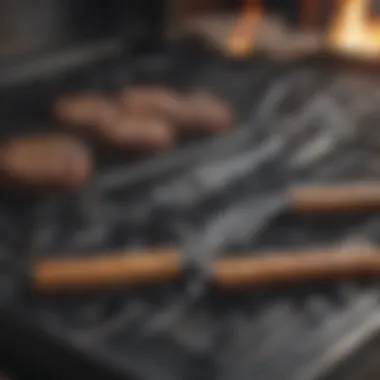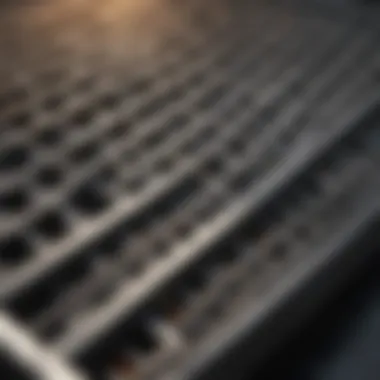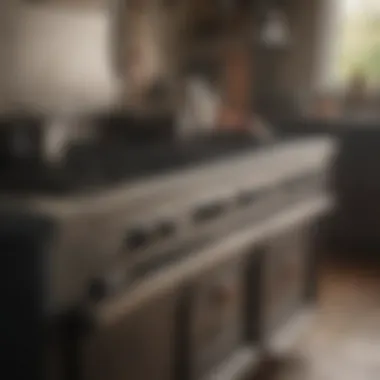Essential Techniques for Cleaning Your Stove Grill


Intro
Cleaning a stove grill often takes a backseat in the busy lives we lead. However, neglecting this task can lead to stained surfaces and even questionable hygiene in the kitchen. In this guide, we will roll up our sleeves and dive into the nitty-gritty of maintaining a clean stove grill. You'll discover why keeping this essential cooking tool spotless matters more than just aesthetics. We will also cover the specific tools you need and provide step-by-step instructions, no matter what type of grill you have. By the end of this article, you’ll be armed not only with knowledge but also practical tips to ensure your cooking environment remains clean and welcoming.
The truth is, a clean stove grill is not just about looks; it can significantly affect your cooking. When grease builds up, it can warp flavors, cause smoke stains, and even lead to fires. That’s right! You don’t want your favorite lasagna tasting like last week’s barbecue, do you? So, let’s embark on this cleaning journey, making your stove grill not just functional but also hygienic and ready for your next culinary creation.
Understanding the Importance of a Clean Stove Grill
Keeping your stove grill clean is not just a matter of aesthetics; it carries a weighty significance that impacts health, functionality, and even the personal enjoyment of cooking. When grills are frequently maintained, they're not only safer to use, but also enhance the overall culinary experience. Let's explore these dimensions more closely.
Health Considerations
A dirty grill can become a breeding ground for bacteria. When food particles accumulate, microscopic critters can hitch a ride into your meals, posing potential health risks. It’s vital to remember that food safety begins long before it hits your plate.
- Cross-Contamination Risk: If you grill meat that isn’t well-cleaned, you risk contaminating other foods with harmful pathogens. For instance, grease buildup from previous cooking can lead to unsightly burns, having a direct correlation with foodborne illnesses.
- Allergen Exposure: Allergens often nestle into the crevices of a filthy grill. If you or your guests have particular sensitivities, a clean surface mitigates unexpected reactions.
- Smoke and Residue: The buildup creates a rancid smoke that isn’t just unpleasant. It's a wonderfully nasty concoction stamped with unhealthy carbon compounds that could even alter the flavor of your food. Eating should be a joy, not a gamble with your health, right?
Enhancing Cooking Efficiency
A clean grill improves cooking performance. Think of it as prepping your stage before a grand show. An unobstructed grill surface ensures that heat is distributed effectively, which is crucial for achieving evenly cooked dishes.
- Optimal Heat Distribution: When food debris clogs the grill, it can lead to uneven heating. A clean grill responds better to temperature adjustments, allowing precision in cooking. Goodbye undercooked burgers; hello perfectly seared steaks!
- Faster Cooking Times: Without grease and grime, food spends less time battling the elements and more time cooking. This not only enhances flavor but also saves you precious minutes, especially on busy weeknights.
Aesthetic Appeal
A sparkly, well-maintained grill transforms your cooking area. Let’s be honest, cooking is as much about the experience as it is about the end result. A shiny grill sends a message to guests about the care and attention put into food preparation.
- Welcoming Atmosphere: An immaculate cooking space invites engagement. Friends and family are more likely to gather around a spotless grill, sharing stories and laughter while waiting for delicious meals to finish.
- Personal Reflection: A clean grill reflects personal diligence and pride in your culinary domain. It speaks volumes about your dedication to cooking with integrity.
"A clean space yields clarity in the kitchen, nurturing creativity within bounds of art and skill."
In summary, understanding the importance of a clean stove grill is more than just a chore; it intertwines health, efficiency, and aesthetic value. With every scrub, you're ensuring that your culinary practices uphold the highest standards.
Tool and Supplies for Grill Cleaning
Cleaning your stove grill is not just about maintaining its shiny surface; it’s a matter of functionality and safety. In this section, we dive into the essential tools and supplies needed for a thorough cleaning process. The right items can make the difference between a mundane chore and an effective, hassle-free experience. Having the appropriate tools not only speeds up the work but also ensures that every corner of your grill gets the attention it deserves. A well-equipped cleaning kit leads to better outcomes, extending the life of your grill while also enhancing your cooking adventures.
Basic Cleaning Supplies
You don’t need an extravagant arsenal to clean your grill effectively. Sometimes it's the simplest items that do the job best. Here’s a checklist of basic cleaning supplies that should be in every homeowner's toolkit:
- Mild dish soap: Effective for cutting through grease and grime without harming the grill surface.
- Water: Often underestimated, plain water mixed with some soap can do wonders.
- Sponges and cloths: Soft enough to prevent scratches but durable enough to tackle tough stains.
- Scrubbing brush: A grill brush with brass or nylon bristles can help dislodge food particles stuck to surfaces.
Each of these items plays its role, making it easier to keep your grill in tip-top shape. Ignoring even the most minor cleaning supplies may result in a longer cleaning process, and let's face it—nobody wants the hassle when it can be avoided.
Specialized Tools


As you advance in your grill cleaning routine, you might consider stepping up your game with specialized tools designed for precise needs. Utilizing these tools can ultimately simplify your cleaning process.
- Grill cleaning robot: This gadget is a game changer, especially for regular grill users. It does the scrubbing for you, allowing you to sit back and relax.
- Steam cleaners: Perfect for deep cleaning without harsh chemicals, steam cleaners can offer a great solution for tough, stuck-on grease.
- Putty knife or scraper: Useful for tackling stubborn stains or residues that are otherwise difficult to remove. Just be careful not to scratch the surface.
- Magnetic grill mats: These mats keep drippings under control, minimizing mess while you cook, but they’re also easy to remove for cleaning.
Incorporating these specialized tools not only enhances the cleaning experience, it also helps in maintaining the grill’s functionality and aesthetics.
"The right tools make all the difference between cleaning as a chore and cleaning as a breeze."
Equipping yourself with these basic and specialized tools prepares you for an effective and efficient grilling cleanup routine. Investing time and resources into your cleaning toolkit ensures that your stove grill remains a reliable partner for all your culinary endeavors.
Preparation Steps Before Cleaning
Before diving headfirst into the task of cleaning your stove grill, it's crucial to lay some groundwork. Preparation is not just an afterthought, but a vital stage that can significantly impact the ease and effectiveness of your cleaning endeavor. By following a few key steps before the scrubbing starts, you set yourself up for success while minimizing the potential for accidents.
Safety Precautions
When confronting the grease and grime that often accumulates on grills, safety should be your first priority. Before putting on those rubber gloves, consider the following:
- Turn Off the Grill: If you’ve been using your gas or electric grill, ensure it’s completely turned off. This mitigates the risk of burns or gas leaks while you clean.
- Cold Surface Required: Make sure the grill is cool to the touch. Attempts to clean a hot surface can lead to injuries or damage to cleaning equipment.
- Ventilation is Key: If you're working in an enclosed space, opening windows or using a fan can help disperse any harsh fumes from cleaning agents. Fumes can be potent; you want to avoid breathing them in.
- Protective Gear: Wear gloves to protect your hands from chemicals and sharp surfaces. Eye protection, like goggles, can also be a good idea if you’re working with sprays or scrubbing compounds that could splatter.
Taking these safety precautions transforms your cleaning task into a manageable, less daunting chore, and allows you to focus on the job at hand without worrying about mishaps.
Gathering Necessary Tools
Once you're assured that safety matters have been addressed, it's time to gather your equipment. Having the right tools on hand can make the cleaning process smoother and more efficient. Consider these essential items:
- Basic Cleaning Supplies:
- Specialized Tools:
- Dish Soap: A simple grease-cutting dish soap is often effective for general cleaning.
- Water: It sounds basic but helps dissolve grime.
- Sponge or Cloths: Soft sponges for gentle scrubbing and microfiber cloths for drying and polishing.
- Grill Brush: Opt for a stainless steel grill brush that can handle tough debris without scratching the surface of your grill.
- Putty Knife or Scraper: Useful for scraping off burnt-on residues that will neither come off with a sponge nor a cloth.
- Spray Bottle: For applying cleaning solutions effectively.
- Bucket: Handy for rinsing and washing your sponges or cloths as you work.
Having these tools ready ensures you won't be running around searching for what you need halfway through scrubbing the grates. It can be frustrating tu say the least.
By carefully assessing the safety factors and gathering all necessary equipment, you lay a strong foundation for the cleaning process ahead. Now that you're prepared, you're ready to tackle that stove grill with confidence, setting the stage for a gleaming kitchen centerpiece.
Step-by-Step Guide for Cleaning Different Grill Types
Cleaning your stove grill properly is critical for both its performance and your health. Depending on the type of grill, the cleaning techniques may vary. A thorough understanding of these differences can lead to a more effective cleaning process, ensuring that your grill remains in prime condition for years to come.
Cleaning Cast Iron Grills
Removing Debris
When it comes to removing debris, the objective is straightforward: eliminate all the remnants of your last cookout. This includes charred bits of food and residual fats, which, if not dealt with, can quickly build up and lead to unwanted flavors in future meals. The main characteristic here is the emphasis on thoroughness. This method is popular because it sets the stage for deeper cleaning tasks like scrubbing and seasoning.


One consideration is that you can use a stiff brush or a spatula to scrape off the larger clumps of debris. Just be mindful not to scratch the iron surface excessively, as that could affect the flavor profile of your meals over time.
Scrubbing Techniques
Once you've removed the bulk of the debris, it’s time to engage in scrubbing techniques. Choosing the right scrubber makes a world of difference here. The preferred option for cast iron is usually a chainmail scrubber or a heavy-duty scrub brush. These tools can reach into the crevices of your grill and effectively remove stubborn grime.
The advantage of this method is primarily the depth of clean it provides. However, it’s key not to use too much water, as that can rust the grill.
Seasoning Post-Cleaning
After a good scrub, seasoning is crucial for maintaining the grill’s non-stick quality. This involves applying a thin layer of oil—ideally flaxseed or grapeseed—before heating the grill to a high temperature. The oil bonds to the cast iron, forming a protective layer.
This step not only ensures easier cooking but also extends the grill’s lifespan by preventing rust. If neglected, however, it could lead to a sticky cooking surface.
Cleaning Stainless Steel Grills
Using Appropriate Cleaners
In the realm of stainless steel grills, choosing the right cleaner is essential. pH-balanced cleaners are ideal, as they won’t damage the surface finish. This is crucial because a harsh chemical could cause spotting or rust, negating stainless steel’s primary benefits.
Keeping your grill looking shiny and new is one significant appeal of this cleaning method, but remember to check that the cleaner is safe for food contact surfaces.
Polishing Techniques
Polishing techniques play a crucial role in the aesthetics and maintenance of stainless steel grills. Using a soft cloth with a stainless-steel polish can not only remove smudges but also restore that beautiful shine.
It's a functional and aesthetic step; however, one must be cautious with abrasive tools, which can lead to scratches that mar the surface.
Cleaning Electric Grills
Disassembling Components
Disassembling components is vital for ensuring a thorough clean. Electric grills often have removable plates and trays that require attention. Carefully following the manufacturer’s instructions makes this task easier and reduces the risk of damage.
By taking this step, you can access areas that are often overlooked, accumulating grime over time. It can be tedious but is well worth it for a comprehensive clean.
Safe Cleaning Methods
Once everything is disassembled, it’s critical to use safe cleaning methods. Soft sponges or cloths with non-abrasive detergents work best here. Since you’re dealing with electrical components, avoiding submerging parts in water is also key.
This method ensures a longer lifecycle for the grill and reduces the risk of faults.
Cleaning Gas Grills
Inspecting Burners


Inspecting burners should never be overlooked. This step allows you to identify any blockages that could limit performance. Regular checks help to ensure that flames are even and that heat distribution is what it should be.
This is a practical method that can prevent bigger issues down the road, like uneven cooking or flare-ups.
Cleaning Grease Trays
Cleaning grease trays is equally important. Over time, grease can solidify and lead to greater fire risks. Removing and adequately scrubbing these trays helps ensure safety, along with preventing unpleasant odors when the grill is in use.
This could easily be seen as a chore, but it’s a necessary precaution that protects both your grill and your cooking.
In summary, each grill type requires specific cleaning techniques, and understanding these can ensure that your grill remains not only functional but also safe for your culinary creations.
Post-Cleaning Maintenance Tips
Maintaining a clean stove grill is more than just a one-off chore. It's about embedding a strategy for sustained efficiency and hygiene into your cooking routine. Engaging in post-cleaning maintenance tips can significantly prolong the lifespan of your grill while ensuring that your culinary adventures remain safe and enjoyable. Think of these practices as your grill's health insurance. Without them, you risk a decline into an unkempt state, which can lead to potential hazards, including fire risks. Who'd want to face that heat?
Regular Cleaning Schedule
Establishing a regular cleaning schedule is a cornerstone of effective grill maintenance that many often overlook. By setting aside a specific day each month or after a certain number of cooking sessions, you create a rhythm that embeds cleaning into your routine. This preventive step means buildup of grease and grime never gets a chance to accumulate.
- Benefits: A consistent approach keeps your grill cleaner and minimizes the effort needed for deep cleans. It also ensures your food tastes fresh and flavorful. Over time, little effort compounds into significant results.
- Considerations: Not every grill requires the same maintenance frequency. For instance, if your grill sees heavy use, a bi-weekly schedule might be wise. On the other hand, if you only grill occasionally, a monthly clean may suffice. Tuning into your grill's needs is key.
Preventive Measures
Adopting preventive measures can be the difference between a grill that's a delight to use versus one that's a headache waiting to happen. This means not just cleaning but protecting and understanding the patterns of usage.
Using Grill Covers
Investing in grill covers is often a game changer when it comes to protecting your investment. These covers act as a barrier against dust, rain, and even those pesky bugs. Choosing a cover that fits snugly is paramount.
- Key Characteristic: The material of the cover plays a critical role. Look for durable and breathable options that resist mold and keep moisture at bay.
- Advantages: These covers can dramatically reduce the need for immediate cleaning. If your grill is shielded from the elements, you’ll spend less time scrubbing and more time grilling. A good cover also prolongs the life of your grill, saving you money in the long run.
Monitoring Cooking Habits
Keeping an eye on your cooking habits is surprisingly influential. This stretches beyond just what you grill but also how often and the techniques employed.
- Key Characteristic: Understanding the types of food you prepare can guide your preventative measures. For example, utilizing marinades or oily recipes might mean a need for more frequent cleaning.
- Unique Feature: Assessing how much buildup occurs after each use can alter your cleaning routine. If you notice more residue from certain foods, adjust accordingly. You may find that grilling lean meats versus fatty cuts influences residue much more than you previously considered.
"A small effort daily saves a lot of trouble tomorrow."
By combining these two pillars—regular maintenance and smart cooking choices—you’re not just performing a task; you’re cultivating a habit that benefits both your grill and your culinary experiences.
Understanding these post-cleaning strategies underlines the importance of being proactive. Embedding these methods into your cooking lifestyle not only enhances the functionality of your grill but also fosters a more enjoyable cooking atmosphere.
Finale
Cleaning a stove grill is not just a chore; it is a vital part of a kitchen's maintenance that significantly affects health, cooking efficiency, and overall enjoyment in the kitchen. By keeping your stove grill in tip-top shape, you not only ensure that your food is free from harmful residues but also create an inviting space for culinary creativity. A clear grill serves as an open canvas, allowing flavors to shine without the interference of charred remnants or grease buildup.
Reflecting on the steps outlined in this guide, the importance of a consistent cleaning routine can't be understated. Not only does this protect your family from potential sickness, but it also enhances your cooking experience. When the grill is clean, it heats evenly and efficiently, ensuring that each meal is cooked to perfection. Plus, there’s something universally appealing about cooking on a spotless grill – the sheer aesthetic benefit elevates both your kitchen and your cooking.
"A clean kitchen is a happy kitchen."















